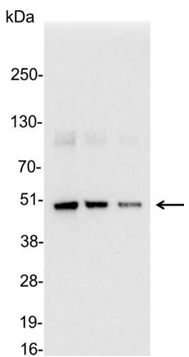Anti-ECS Antibody (18832)
Data
- -
- -
Antibody DetailsProduct DetailsHost Species Rabbit Immunogen DDDDK conjugated to KLH. Product Concentration 1.0 mg/ml Formulation Phosphate Buffered Saline (PBS), 0.09% sodium azide. State of Matter Liquid Product Preparation Purified by peptide affinity chromatography Storage and Handling This antibody is stable for at least one (1) year at 2-8°C. Country of Origin USA Shipping Next Day 2-8°C Applications and Recommended Usage? Quality Tested by Leinco Immunoblotting: use at a dilution of 1:1,000- 1:20,000
Immunocytochemistry: use at a dilution of 1:100-1:400. Immunoprecipitation: use 1-4ug/mg lysate ELISA: for detection use at a dilution of 1:1,000-1:30,000; for coating use at a dilution of 1:100-1:500. These are recommended dilutions. End users should determine optimal dilutions for their applications. Each investigator should determine their own optimal working dilution for specific applications. See directions on lot specific datasheets, as information may periodically change. DescriptionSpecificity Rabbit Polyclonal Antibody specific to ECS. Background Enterokinase, also known as enteropeptidase, is a serine protease that catalyzes the hydrolysis of peptide bonds in proteins but, unlike other kinases, does not catalyze transfer of phosphate groups. Enterokinase cleaves proteins following a lysine at an enterokinase cleavage site, or ECS (Asp-Asp-Asp-Asp-Lys). In vivo, this cleavage results in trypsin-dependent activation of other pancreatic zymogens, such as chymotrypsinogen, proelastase, procarboxypeptidase and prolipase in the lumen of the gut. Antigen DetailsFunction Responsible for initiating activation of pancreatic proteolytic proenzymes (trypsin, chymotrypsin and carboxypeptidase A). It catalyzes the conversion of trypsinogen to trypsin which in turn activates other proenzymes including chymotrypsinogen, procarboxypeptidases, and proelastases. UniProt.org Research Area Epitope Tags References & CitationsTechnical Protocols |



